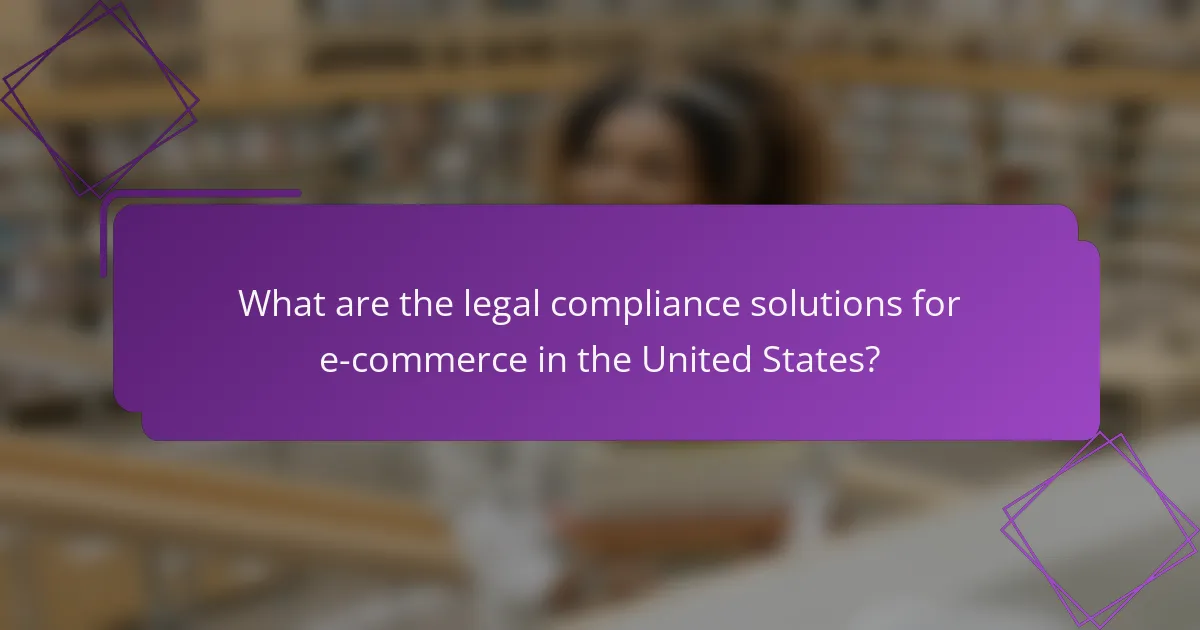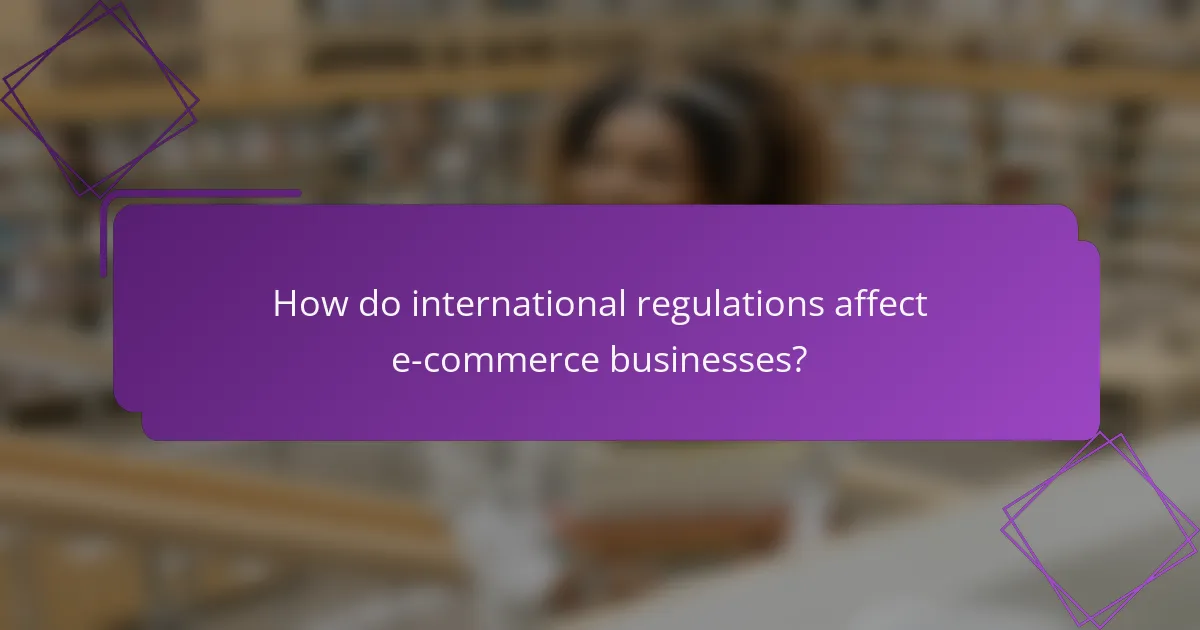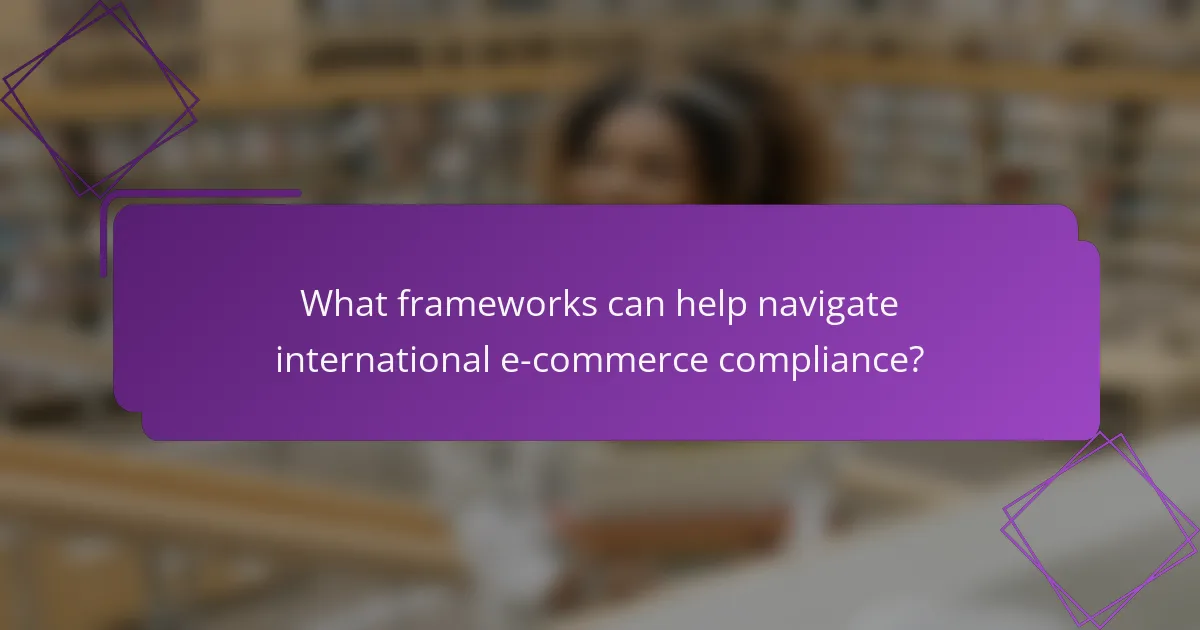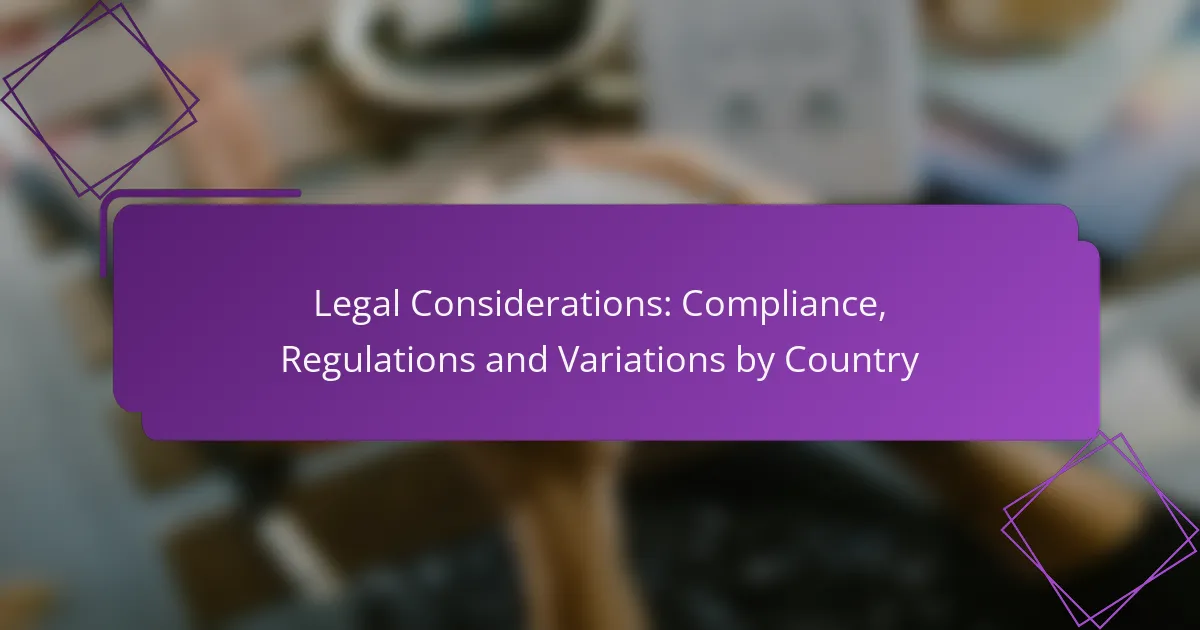In the rapidly evolving landscape of e-commerce, understanding legal considerations is paramount for businesses operating across different countries. Compliance with regulations related to data protection, sales tax, and consumer rights varies significantly by jurisdiction, necessitating a thorough grasp of local laws. Failure to adhere to these legal frameworks can result in severe penalties, making it essential for companies to stay informed and proactive in their compliance efforts.

What are the legal compliance solutions for e-commerce in the United States?
Legal compliance solutions for e-commerce in the United States involve adhering to various regulations that govern data protection, sales tax, consumer rights, and payment processing. Understanding these legal frameworks is essential for businesses to operate smoothly and avoid penalties.
Data protection regulations
In the U.S., data protection regulations primarily revolve around the California Consumer Privacy Act (CCPA) and the Health Insurance Portability and Accountability Act (HIPAA) for health-related data. E-commerce businesses must ensure they collect, store, and process customer data in compliance with these laws, which include providing transparency about data usage and allowing consumers to opt-out of data sharing.
To comply, businesses should implement robust privacy policies, conduct regular audits, and train employees on data handling practices. Failure to comply can result in significant fines, often reaching into the millions for larger companies.
Sales tax compliance
Sales tax compliance requires e-commerce businesses to collect and remit sales tax based on the location of the buyer. The Supreme Court ruling in South Dakota v. Wayfair, Inc. allows states to impose sales tax on online sales, even if the seller does not have a physical presence in the state.
Businesses should determine their nexus in various states, which can be based on sales volume or transaction numbers. Utilizing automated sales tax solutions can simplify compliance by calculating the correct tax rates and generating necessary reports.
Consumer protection laws
Consumer protection laws in the U.S. are designed to ensure fair treatment of customers. The Federal Trade Commission (FTC) enforces regulations that prohibit deceptive advertising and ensure truthful marketing practices. E-commerce businesses must provide clear product descriptions, accurate pricing, and transparent return policies.
To avoid legal issues, companies should familiarize themselves with the FTC guidelines and ensure that all marketing materials are compliant. Regularly reviewing customer feedback can also help identify potential areas of concern.
Payment processing regulations
Payment processing regulations in the U.S. are governed by the Payment Card Industry Data Security Standard (PCI DSS), which sets requirements for secure handling of credit card information. E-commerce businesses must ensure that their payment systems are PCI compliant to protect customer data and avoid breaches.
Implementing secure payment gateways and regularly updating security protocols are crucial steps. Non-compliance can lead to hefty fines and loss of customer trust, making it essential for businesses to prioritize security in their payment processing systems.

How do international regulations affect e-commerce businesses?
International regulations significantly impact e-commerce businesses by dictating how they handle data, conduct transactions, and comply with local laws. Understanding these regulations is crucial for maintaining compliance and avoiding legal penalties.
GDPR in the European Union
The General Data Protection Regulation (GDPR) is a comprehensive data protection law in the EU that affects any business handling personal data of EU residents. E-commerce companies must ensure transparency in data collection, obtain explicit consent, and provide users with rights to access and delete their data.
Non-compliance can lead to substantial fines, often reaching up to 4% of annual global turnover or €20 million, whichever is higher. Businesses should implement data protection measures and conduct regular audits to ensure adherence to GDPR standards.
CCPA in California
The California Consumer Privacy Act (CCPA) grants California residents specific rights regarding their personal information, including the right to know what data is collected and the right to opt-out of its sale. E-commerce businesses operating in California must provide clear privacy notices and allow consumers to exercise their rights easily.
Fines for non-compliance can be significant, ranging from $2,500 for unintentional violations to $7,500 for intentional ones. Companies should update their privacy policies and ensure they have mechanisms in place for consumers to manage their data preferences.
Cross-border trade regulations
Cross-border trade regulations govern the import and export of goods between countries, impacting e-commerce businesses that operate internationally. These regulations can include tariffs, customs duties, and compliance with local laws in the destination country.
Businesses should familiarize themselves with the regulations of each country they sell to, as requirements can vary widely. Utilizing a customs broker can help navigate these complexities and ensure compliance with all relevant trade laws.

What are the key compliance challenges for e-commerce in Canada?
The key compliance challenges for e-commerce in Canada include navigating complex privacy laws, understanding sales tax variations across provinces, and adhering to strict advertising standards. Each of these areas requires careful attention to ensure that businesses operate legally and effectively in the Canadian market.
Privacy laws in Canada
Canada’s privacy laws, primarily governed by the Personal Information Protection and Electronic Documents Act (PIPEDA), require businesses to obtain consent when collecting personal data. E-commerce companies must ensure that they have clear privacy policies and that customers are informed about how their data will be used.
Additionally, provincial laws, such as those in Quebec, may impose stricter requirements. Businesses should regularly review their data handling practices to remain compliant and avoid potential penalties.
Sales tax variations by province
Sales tax in Canada varies significantly by province, with some provinces implementing a Goods and Services Tax (GST), while others have a Harmonized Sales Tax (HST) or a Provincial Sales Tax (PST). For example, British Columbia has a 5% GST plus a 7% PST, while Ontario has a combined HST of 13%.
E-commerce businesses must register for tax collection in each province where they sell goods or services and ensure they charge the correct rate. Keeping track of these variations is crucial to avoid compliance issues and potential fines.
Advertising standards compliance
Advertising in Canada is regulated by the Competition Act and the Canadian Code of Advertising Standards, which require that advertisements be truthful and not misleading. E-commerce businesses must ensure that their marketing materials comply with these regulations to avoid legal repercussions.
Additionally, specific sectors, such as health and finance, have additional advertising rules. Companies should conduct regular audits of their advertising practices to ensure compliance and maintain consumer trust.

What are the variations in e-commerce regulations by country?
E-commerce regulations vary significantly by country, impacting how businesses operate online. Key factors include consumer protection laws, data privacy regulations, and taxation policies that differ across regions.
Comparison of EU vs. US regulations
The European Union (EU) has stringent regulations compared to the United States, particularly regarding data protection and consumer rights. The General Data Protection Regulation (GDPR) mandates strict data handling practices, while the US relies more on sector-specific laws.
In the EU, consumers have robust rights, including the right to return goods within 14 days and clear information on pricing. In contrast, US regulations are less uniform, with varying state laws affecting returns and disclosures.
Asia-Pacific e-commerce regulations
The Asia-Pacific region presents a diverse regulatory landscape, with countries like China enforcing strict e-commerce laws, including the Cybersecurity Law that governs data protection and online transactions. Other nations, such as Australia, have more balanced regulations focusing on consumer rights and business compliance.
Businesses operating in this region must navigate local laws, which may include specific requirements for product safety, advertising standards, and cross-border trade regulations. Understanding these nuances is crucial for compliance.
Latin America compliance requirements
In Latin America, e-commerce regulations are evolving, with countries like Brazil implementing the General Data Protection Law (LGPD) to enhance consumer privacy. Compliance can be complex due to varying laws across countries, affecting data handling and consumer rights.
Businesses should be aware of local tax regulations, such as the Digital Services Tax in some countries, which can impact pricing strategies. Companies must also ensure transparency in transactions to build consumer trust and avoid legal pitfalls.

What frameworks can help navigate international e-commerce compliance?
Several frameworks can assist businesses in managing international e-commerce compliance, including legal guidelines, industry standards, and best practices. Utilizing these frameworks helps ensure adherence to various regulations across different countries, reducing the risk of legal issues.
Compliance checklists
Compliance checklists serve as practical tools for e-commerce businesses to ensure they meet necessary legal requirements. These lists typically cover areas such as data protection, consumer rights, and taxation obligations, which can vary significantly by country.
For example, a checklist for selling in the European Union might include GDPR compliance for data handling, while a checklist for the U.S. could focus on the Children’s Online Privacy Protection Act (COPPA). Regularly updating these checklists is crucial as regulations evolve.
Legal consultation services
Legal consultation services provide expert guidance on navigating the complexities of international e-commerce laws. Engaging with legal professionals can help businesses understand specific regulations applicable to their operations in different jurisdictions.
These services can range from one-time consultations to ongoing support, depending on the business’s needs. For instance, a company expanding into new markets might benefit from a comprehensive legal review to identify compliance gaps and mitigate risks effectively.

How can e-commerce businesses prepare for future regulatory changes?
E-commerce businesses can prepare for future regulatory changes by staying informed about potential shifts in laws and adapting their operations accordingly. Proactive measures include monitoring regulations, implementing flexible business practices, and ensuring compliance with local and international standards.
Monitoring emerging regulations
To effectively monitor emerging regulations, e-commerce businesses should subscribe to industry newsletters, attend relevant conferences, and engage with legal experts. This helps in identifying trends and potential changes in regulations that could impact operations.
Regularly reviewing updates from government agencies and regulatory bodies is crucial. For example, in the European Union, businesses should keep an eye on the General Data Protection Regulation (GDPR) and its evolving interpretations.
Adapting business practices
Adapting business practices involves integrating flexibility into operations to accommodate new regulations. This may include revising privacy policies, updating terms of service, or changing payment processing methods to comply with local laws.
Businesses should also conduct regular compliance audits to identify areas needing adjustment. For instance, if a new tax regulation is introduced, companies must ensure their accounting systems can handle the changes without significant disruption.



